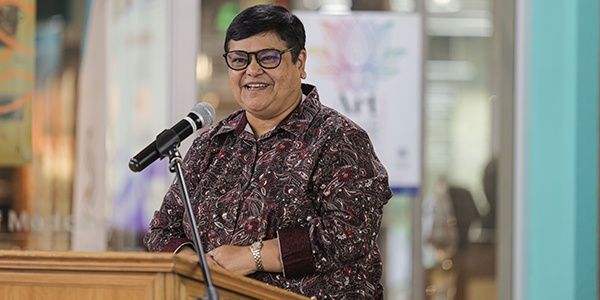Renowned geneticist reflects on her journey with Wits
- Wits University
Professor Himla Soodyall has paid homage to great scientists who helped carve her path.
Having started her career within the human genetics department at Wits in 1987, geneticist and Secretary General of the Academy of Science of South Africa (ASSAf), Professor Himla Soodyall says she cut her teeth in the new age of genetics that hit South Africa in the late 1980s.

Delivering the Botlhale Orenstein Memorial Lecture (BOML), hosted at the Adler Museum of Medicine in the Faculty of Health Sciences and virtually on 28 September 2022, Soodyall paid homage to renowned scientists that played a role in her becoming one of the top geneticists in the country.
Once known as the AJ Orenstein Memorial Lecture, the BOML was first held in 1962 when the Adler Museum of Medicine was founded. With over 40 lecturers delivered so far, the lecture honours the memory of the late Major General Orenstein for his role in the establishment of the medical services in the mining industry.
Going down memory lane, Soodyall recalled how Wits Professor Trefor Jenkins took her under his wing as a young 23-year-old from Durban who only had a master’s degree in biotechnology at the time.
“I’m privileged to be from the stable of the Trefor Jenkins department because not only was he a mentor to me but a true friend and, having come from Durban from a very conservative Indian family background, he served also as my mentor and father in the absence of my parents who were in Durban,” said Soodyall.
She added that Jenkins believed in her so much that he in 1990, together with another lecturer, put together an application and nominated her as a Share Fellow. This landed her a fellowship at Penn State University, Pennsylvania, which used to honour a faculty member from Wits University, University of Cape Town and the University of the Western Cape, on a rotation basis.
Since then, Soodyall has gone to lead ground-breaking genetics research where she identified some of the oldest DNA found in living people today. The research on the people from sub-Saharan Africa added weight to the theory that modern humans evolved from southern Africa.
“We showed quite convincingly that the genetic profiles of people in the Khoi and the San groups are almost exclusively Khoi and San living individuals,” she explained.
With a career spanning at least 35 years, she is also the first geneticist to conduct prenatal diagnostics for cystic fibrosis before the gene was even known and this, she says, was the turning point in her career.
Soodyall believes that the repertoire of scientists with a multidisciplinary format of research at Wits is what has given the institution the edge it has maintained for 100 years.
She further added that her other mentor, Professor George Nurse, with whom she shared the first draft of her Phd, was someone she could rely on for constructive criticism and guidance.
“From archaeologists, anthropologists, rock art specialists and the works, we have that niche here at Wits, and even though I was up the road and outside of the hub of the University culture, it was Trefor who sent me to a meeting in the Cape, and I went with George Nurse and his wife,” she explained.
She further added that, “This is that niche, because somewhere on the campus, there is somebody who has an expertise in at least these and many other ways.”
Collaborations and maintaining relationships with fellow researchers and communities where they conducted their research earned Soodyall and her research teams the trust of those they worked with, making it easy for them to make ground-breaking discoveries.
They achieved this by also taking part in some community related issues and going back to give the results of their research to the communities.
According to her, the University’s strong protocol for research and ethics, where informed consent is crucial, gained her favour with the San community.
“The San community refused to give permits for broad consent and I am the only researcher in the world that they have given the permit to conduct co-genome sequencing, and that is because over the years I have established a relationship with them,” she said.

